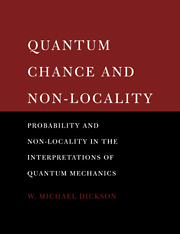 Quantum Chance and Non-locality
Quantum Chance and Non-locality Published online by Cambridge University Press: 11 September 2009
Quantum probability and quantum mechanics
The formalism of quantum probability theory
Discussions of quantum mechanics are often confused by a lack of clarity about what exactly constitutes ‘quantum mechanics’. It is therefore useful to try at the start to isolate a consistent mathematical core of quantum mechanics, and consider anything that goes beyond this core to be ‘interpretation’. For us, this core is quantum probability theory.
Quantum probability is a generalization of classical probability, and therefore I begin with a brief review of the latter. I assume that the reader has some familiarity with the ideas of probability theory. What follows is just to provide a quick review, and to establish some notation and terminology.
In modern classical probability theory, probabilities are defined over algebras of events. The motivation is straightforward: we begin with a set of ‘primitive’, or ‘simple’, events (the ‘sample space’), and form an algebra of events by taking all logical combinations of the simple events. For example, let us take the simple events to be the possible results of rolling a six-sided die one time, so that the sample space is the set {1,2,3,4,5,6}. We then form an algebra of events from the sample space by taking all possible logical combinations of the simple events. Logical combinations include, for example, ‘either 3 or 5’ and ‘not 3 and not 2’.
To save this book to your Kindle, first ensure [email protected] is added to your Approved Personal Document E-mail List under your Personal Document Settings on the Manage Your Content and Devices page of your Amazon account. Then enter the ‘name’ part of your Kindle email address below. Find out more about saving to your Kindle.
Note you can select to save to either the @free.kindle.com or @kindle.com variations. ‘@free.kindle.com’ emails are free but can only be saved to your device when it is connected to wi-fi. ‘@kindle.com’ emails can be delivered even when you are not connected to wi-fi, but note that service fees apply.
Find out more about the Kindle Personal Document Service.
To save content items to your account, please confirm that you agree to abide by our usage policies. If this is the first time you use this feature, you will be asked to authorise Cambridge Core to connect with your account. Find out more about saving content to Dropbox.
To save content items to your account, please confirm that you agree to abide by our usage policies. If this is the first time you use this feature, you will be asked to authorise Cambridge Core to connect with your account. Find out more about saving content to Google Drive.